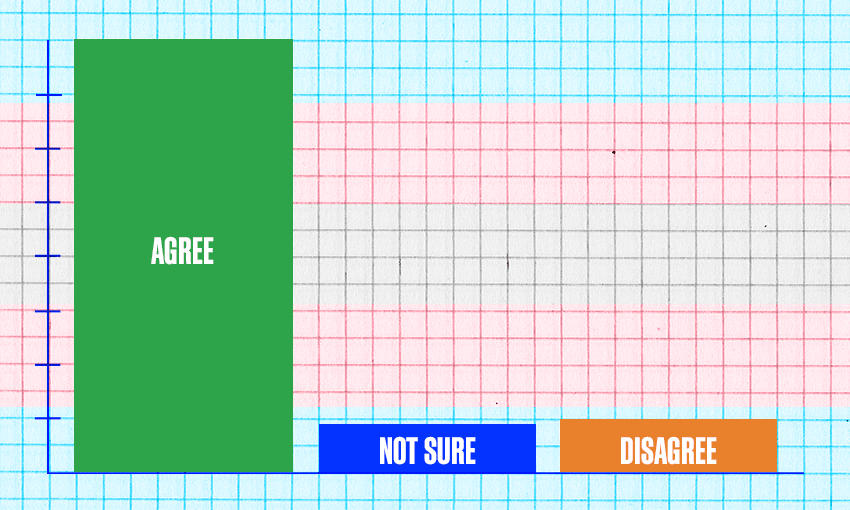New Zealand scored highest in a recent global survey on protection against discrimination of transgender people, but for some, that sentiment did not extend to access to single-sex facilities.
The latest global survey from Ipsos – the LGBT+ Pride 2023 survey – shows that 84% of New Zealanders believe transgender people should be protected from discrimination in employment, housing and access to businesses. The report, released today, comes after the March visit from anti-trans campaigner Kellie-Jay Keen-Minshull (Posie Parker) sparked fiery debate and protest around transgender rights in Aotearoa. Of the 30 countries surveyed, New Zealand scored highest on its views on discrimination protection, and globally, all generations (Gen Z, Millenial, Gen X, Boomer) scored equally. Put another way, New Zealand scored the lowest (8%) for those who believed transgender people should not be protected from discrimination.
A majority of New Zealanders (63%) also believe that transgender people face “a great deal/fair amount” of discrimination, with 18% not sure and 20% believing they face little to no discrimination. And this is where generational differences show. In New Zealand, younger people (Gen Z) are most likely to believe that transgender people experience a great deal of discrimination (73%) while older people (Boomers) are least likely (62%). Females consider the discrimination to be greater than males.
There were a number of questions asked within the survey relating to transgender discrimination, gender-affirming care, access to single sex facilities according to gender identity, official documents and gender transition healthcare. Globally, boomers were most supportive of protection against discrimination (specifically around employment and housing) but least supportive of health insurance systems covering gender transition costs and transgender people being allowed to use single-sex facilities that correspond with their gender identity. With the exception of health insurance subsidies, there was a global majority in favour of trans people accessing gender-affirming care, public facilities and having official documents offer more options than male and female for those who don’t identify as either.
Notably, while there was overwhelming support for transgender people to be protected against discrimination, that number dropped (in New Zealand and globally) when it came to transgender people being allowed access to single-sex spaces according to their gender identity. Much of the debate in recent months has swirled around a disagreement over whether it is discriminatory to exclude trans people from single sex spaces. Parker was firmly against allowing access for trans women in women-only spaces. The majority of respondents across all 30 countries believed trans people should have that access. In New Zealand specifically it was 55%, with 17% not sure.
This week, the Media Council released its decisions on six official complaints about reporting trans rights. It upheld one complaint against Stuff for “lack of balance” in an article reporting that the Ministry of Health had reiterated its guidance that puberty blockers are safe and reversible for young people wanting to halt potentially unwanted physical changes. The Media Council determined that Stuff should have presented an opposing view on puberty blockers’ effects. Stuff argued that in regards to the safety of puberty blockers, presenting both sides would “represent false balance”, similar to including a climate-change denier’s views in an article on global warming. The complaint was upheld with dissent.
In the latest Ipsos survey, 59% of New Zealanders believed teenagers (with parental consent) should be allowed to receive gender-affirming care, including counselling and hormone replacement treatment.



